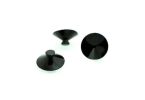Table of Contents
Have you ever wondered how thick the glass in your aquarium is? The thickness of aquarium glass is a crucial factor in ensuring the safety and durability of your tank.
In this article, we will explore the various factors that determine the thickness of aquarium glass, including the size and shape of the tank, as well as the water pressure it needs to withstand.
Whether you’re a seasoned aquarist or a beginner, read on to discover how to calculate the appropriate thickness for your aquarium glass and ensure the safety of your aquatic pets.
Aquarium glass thickness is determined by a variety of factors, including the size of the tank, the type of fish and plants being kept, and the environment in which the tank will be placed. While thinner glass may be less expensive, it is also more prone to cracking and breaking, which can be dangerous for both the fish and the people around the tank.
On the other hand, thicker glass can provide greater durability and safety, but can also be more expensive. Finding the right balance between cost and safety is key when choosing the right aquarium glass thickness.
Aquarium Glass Thickness
Aquarium glass thickness is an important factor to consider when building or purchasing an aquarium. The thickness of the glass determines the strength and durability of the aquarium, as well as the safety of the aquatic life inside.
In this section, we will discuss the standard glass thickness, tempered glass thickness, and acrylic glass thickness commonly used in aquariums.
Standard Glass Thickness
The most common type of glass used in aquariums is standard float glass. Standard glass thickness ranges from 3/16 inch (4.8 mm) to 1/2 inch (12 mm).
The thickness of the glass depends on the size of the aquarium and the amount of water it will hold. A general rule of thumb is to use a safety factor of 3.8 when calculating the ideal glass thickness for an aquarium.
This safety factor takes into account the weight of the water and any additional weight from rocks, decorations, and aquatic life.
Tempered Glass Thickness
Tempered glass is a type of safety glass that is stronger and more durable than standard glass. Tempered glass is commonly used in aquariums because it is less likely to break and is safer for the aquatic life inside.
The thickness of tempered glass depends on the size of the aquarium and the amount of water it will hold.
A general rule of thumb is to use a safety factor of 4.0 when calculating the ideal tempered glass thickness for an aquarium.
Acrylic Glass Thickness
Acrylic glass is a type of plastic that is lighter and stronger than standard glass. Acrylic glass is commonly used in aquariums because it is less likely to break and is easier to shape and mold than standard glass.
The thickness of acrylic glass depends on the size of the aquarium and the amount of water it will hold. A general rule of thumb is to use a safety factor of 2.0 when calculating the ideal acrylic glass thickness for an aquarium.
In conclusion, the thickness of aquarium glass is an important factor to consider when building or purchasing an aquarium.
Standard glass, tempered glass, and acrylic glass are all commonly used in aquariums and have different thickness requirements based on the size of the aquarium and the amount of water it will hold.
It is important to use a safety factor when calculating the ideal glass thickness to ensure the safety and durability of the aquarium and the aquatic life inside.
Factors That Affect Aquarium Glass Thickness
When it comes to aquariums, glass thickness is a crucial factor to consider. Aquarium glass needs to be strong enough to withstand the water pressure and the weight of the tank.
However, the thickness of the glass depends on several factors, including aquarium size, shape, and water pressure.
Aquarium Size
The size of the aquarium is one of the most critical factors that affect the thickness of the glass. The larger the aquarium, the thicker the glass needs to be.
For example, a small aquarium with a water volume of 10 gallons may only require glass that is 1/4 inch thick. However, a larger aquarium with a water volume of 100 gallons may require glass that is 1/2 inch thick or more.
Aquarium Shape
The shape of the aquarium also affects the thickness of the glass. Rectangular aquariums are the most common and easiest to build, but other shapes like hexagons, cylinders, and bow-front aquariums require thicker glass to maintain their structural integrity.
For example, a bow-front aquarium with a water volume of 75 gallons may require glass that is at least 3/4 inch thick to prevent bowing or cracking.
Water Pressure
Water pressure is another factor that affects the thickness of the glass. The deeper the aquarium, the higher the water pressure, and the thicker the glass needs to be.
Aquariums that are more than 24 inches deep require glass that is at least 1 inch thick to withstand the pressure.
In conclusion, when designing an aquarium, it is essential to consider the size, shape, and water pressure to determine the appropriate thickness of the glass.
Using a glass thickness calculator or consulting an expert can help ensure that the aquarium is safe and structurally sound.
How to Determine the Right Aquarium Glass Thickness
When it comes to choosing the right glass thickness for your aquarium, there are a few factors to consider.
The size of your tank, the type of fish you plan to keep, and the water pressure are all important factors that will affect the thickness of glass needed for your aquarium.
Calculating Water Pressure
Water pressure is one of the most important factors to consider when determining the thickness of glass needed for your aquarium.
The water pressure is determined by the height of the water column in your tank. The higher the water column, the greater the water pressure.
To calculate the water pressure, you can use the following formula:
Pressure (P) = Density of Water (d) x Gravity (g) x Height of Water Column (h)
Once you have calculated the water pressure, you can use a glass thickness calculator to determine the appropriate thickness of glass needed for your aquarium.
Consulting with Experts
If you are unsure about the appropriate thickness of glass for your aquarium, it is always best to consult with experts in the field.
Experienced aquarium builders and professionals can provide valuable advice on the appropriate thickness of glass for your specific tank.
Additionally, it is important to always follow the manufacturer’s recommendations for glass thickness. Most reputable aquarium manufacturers will provide guidelines for the appropriate thickness of glass based on the size and type of tank.
In summary, determining the appropriate thickness of glass for your aquarium requires careful consideration of water pressure and consultation with experts in the field. By taking these factors into account, you can ensure the safety and longevity of your aquarium.







